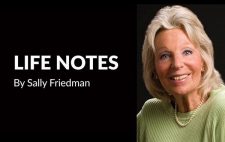I had two reactions – joy and regret – when I came upon some old photos of a family of Soviet Jewish immigrants at Philadelphia International Airport a good 20 years ago. They looked a bit like deer caught in the headlights.
Like the best photos, these recorded a momentous experience in our lives, one that had linked us with a modern generation of those “huddled masses yearning to breathe free.” Once, my own grandparents were those immigrants. And in this era of conflict over immigration, this was a shining example of what it can mean.
It all began with Ann, then a 20-something Soviet Jewish immigrant to South Jersey who had joined our book group through a friend of a friend. We wondered what she would make of us, women at least a full generation older.
Ann didn’t just read with us. She devoured books. Every last page of every last one. We “veterans” were dumbstruck by her devotion, her diligence and her brilliance. Gradually, we learned more about Ann, and the resounding theme was loss. Back in Kiev were her grandfather, a renowned Soviet scholar and author; her parents, her younger sister and her husband’s whole family. They had said goodbye knowing they might never see one another again.
For months, Ann had gone up against the lumbering Soviet system, trying to beat it. But not even the mountains of paperwork could daunt her. Not with what was at stake. And then one night at a book group meeting Ann was bursting with her news: “They’re coming! They’re getting out!” she told us. There were hugs and cheers and a few tear-stained faces that night.
Fast-forward to an early winter evening a few months later. After several false starts, a plane was winging its way from New York to Philadelphia on the last lap of an odyssey that had begun across the world two days before. My husband and I had volunteered, with a profound sense of awe, to assist in the arrival process. So there we were at Philadelphia International Airport with our young friend Ann and several other volunteers.
The clock moved with leaden hands toward the scheduled arrival time – then past it. The short flight from New York to Philadelphia would be late. Suddenly, all the months and years of waiting had become a single, unbearable bundle of anxiety.
But the moment finally came, and there they were – an army of exhausted travelers, young and old, bewildered, dazed, dragging bulging duffel bags and worn suitcases. In the embraces that followed, arms reached, shouts mingled with sobs and time itself was frozen. This was the moment that had sustained hope for these people across the years, across the continents. To bear witness to it was a profound privilege.
We did what we could to help the family settle in South Jersey. So did many others. My husband, who speaks fluent Yiddish, bonded with Ann’s grandfather. Ann’s mother ultimately joined our book group too, amazing us as her daughter had. But in the ebb and flow of modern life, things changed, circumstances altered and our contact dwindled and then was lost. Deep regret there.
But that batch of fading photos took me back to that time, and to one experience that will never leave me. In the happy chaos of that night at the airport, a small, frail young woman – Ann’s sister-in-law – approached me shyly, then decided it was safe to use her halting English to ask a question: “You are Jewish?”
“Yes,” I told her. “I’m Jewish.”
Then, from underneath her blouse she released a tiny Jewish star – the Star of David – and let this symbol of our faith be seen for the first time in her life. “America!” she said. Just that one word. It had never meant more.











